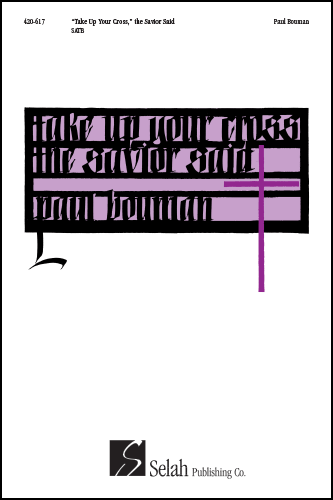|
Composer
Paul Bouman
Text Charles W. Everest
Voicing SATB, a cappella
Topics Christian Life
Church Seasons Lent
Length 2' 10" Price $2.00 (U.S.)
Released 3/96 Catalog no. 420-617
Difficulty Mod. difficult
|
Order now!
Order PDF download!
Min. of 5
Description
An a capella motet for SATB choir, setting the tune DAS LEIDEN DES HERRN. Reminiscent of Distler.
Text
"Take up your cross," the Savior said,
"If you would my disciple be;
forsake the past, and come this day,
and humbly follow after me."
Take up your cross; let not its weight
pervade your soul with vain alarm;
his strength shall bear your spirit up,
sustain your heart, and nerve your arm.
Take up your cross, nor heed the shame,
nor let your foolish heart rebel;
for you the Lord endured the cross
to save your soul from death and hell.
Take up your cross and follow Christ,
nor think till death to lay it down;
for only those who bear the cross
may hope to wear a golden crown.
Text: Charles W. Everest, alt.
|
|


Reviews
"Paul Bouman's SATB motet Take up your cross, the Saviour said has an updated version of C.W. Everest's text to DAS LEIDEN DES HERRN (English Hymnal no. 387). The harmony is in academic neo-antique style (open fifths, melodic inversions, and canon to right of them, canon to left of them, canon in front of them, sometimes seeming forced)."-Bulletin of The Hymn Society of Great Britain and Ireland, April 1996.
"Very fine setting of DAS LEIDEN DES HERRN. Moderately difficult." -Cross Accent, July '96
"a pithy chorale motet on the Gospel for the day [Second Sunday in Lent, Year A], "Take up your cross the Savior said" set by Paul Bouman (Selah 420-617). Jesus' call to discipleship, "take up your cross and follow me" flies in the face of a dulled "Gospel-by-consensus" and in Take Up Your Cross, that is crystal clear. Bouman has splendidly matched Charles Everest's metrical paraphrase of Mark 8:31-38 with an unflinching, rugged chorale melody. Bouman has taken good advantage of the contrapuntal potential of the rising fifth in the melody to firmly impress the text on its hearers." -Grace Notes, October 1996 |






























